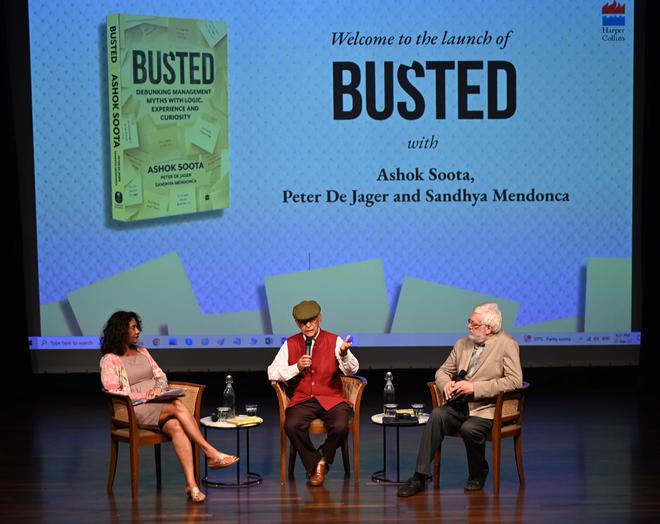There are aphorisms galore in management circles -- It’s lonely at the top; if it ain’t broke, don’t fix it; people leave people, not organisations... and so on -- that are often accepted as undisputed truths. But these are explored, analysed, and busted in the recent book by serial entrepreneur and tech industry veteran Ashok Soota and Peter De Jager, speaker, writer, and consultant on change management, and co-authored by Sandhya Mendonca, a journalist-turned-author.
Busted: Debunking Management Myths With Logic, Experience, and Curiosity questions the relevance of several management truisms and debates if they are just myths that need to be examined or principles that still hold good in today’s rapidly-changing world.
The book also carries a disclaimer of sorts that there is a core of truth in these management truisms and questioning the wisdom of management gurus is not the aim of this book. Yet, it insists it is worth exploring other and newer point of views.

In the opening chapter titled Culture eats strategy for breakfast, Mr. Soota, who co-founded Mindtree (which was later acquired by L&T), Happiest Minds, and other ventures in the health space, says, “In recent years, we have witnessed the adverse impact of negative cultures in high profile companies such as poor governance in Enron and Satyam Computers.’‘ The macho culture or “brotopia” which predominated Uber till the advent of Dara Khosrowshahi, is also prevalent in many Silicon Valley companies, he says. Thus it was not surprising that interest in the belief “culture eats strategy for breakfast” has revived.
On Micheal Porter’s principle “The Essence of Strategy is choosing what not to do”, Soota writes, “There is no doubt that strategy requires constant and prolonged focus, and demands that we learn to say `no’ to new ideas, to protect us from a world of possible distractions.

Jack Welch did not prevent him from saying ‘yes’ to other business opportunities which eventually led General Electric (GE) to a diverse conglomerate that spanned from aircraft engines, medical equipment, and many other realms. However, Bill Gates in a way said `no’ to developing Android, despite being a world leader in operating systems (OS). He later admitted that was his biggest mistake, that he didn’t expand his strategic vision and compete effectively and thus completely missed the exploding OS market for mobile phones, where Google became a dominant force. Soota explains, “So the errors of omission are far costlier than errors of commission, in terms of opportunity cost.”
Even changing focus is accepted, when the whole world, times and concept of ‘focus’ itself changes, he says, “Organisations are entering territories that have been dominated by others. For instance, Google’s entry into operating systems with Android and Microsoft’s entry into search engine with Bing.’‘
Therefore, Mr. Soota concludes entry into the new business does not require a trade-off and you need not say no to other opportunities. The cost of errors of omission is higher than the errors of commission. The latter can be rectified, or course-corrected, while in the former, you don’t even know what opportunity was lost, he cautions.
Should leaders be lonely at the top? On this Mr. Soota firmly says that they need not be, adding that he has not felt it. But when he did feel lonely, he simply decided to leave (as he left MindTree). “If a leader genuinely thinks of and acts towards his team as his family, then again there can be no feeling of loneliness. In fact, far from being lonely, I have experienced a glow of warmth, affection, pride, and gratitude from the teams I have led, for decades,’ the industry leader narrates.
According to him, the reason for loneliness rests on the premise of the “boss-subordinate” prism. It assumes that there is a gap in the relationship between the CEO and the rest. This gap creates loneliness. “I emphasise that the key to avoiding or overcoming the feeling of loneliness is to always be in touch with the team,’‘ advises Mr. Soota, based on his several decades-long experience in consulting with organisations across sectors, cultures and continents.
“Let’s begin with the selective reporting that perpetuates the image of a lonely leader. Much has been made of Tim Cook’s words that his job as the CEO of Apple was ‘lonely’. But as Cook went on to say, ‘I’m not looking for any sympathy; CEOs don’t need any sympathy,” he writes.
What would be of immense help in times of crisis is a supportive network: family, friends, peer group, and yes, perhaps, a coach. Apple CEO Tim Cook has talked about the importance of seeking out advice. He has turned to Warren Buffett for business advice, and Anderson Cooper for guidance before disclosing that he was gay, points out Mr. Soota. Expressing gratitude, developing a mutual learning mindset, and building a support network are among Mr. Soota’s top tips for leaders who feel lonely at the top.
According to Mr. Soota, one of the strangest myths the writers come across is “Fail fast, fail cheap”, because it is contrary to the spirit of entrepreneurship, which requires persistence, resilience, and courage. Also, one should never start a business with the thought of failure, but if it turns out to be unviable, it is better to cut losses, he says.
Writing about the principle “Multitasking is to be always avoided,” he says the virtual world presents an enormous opportunity to improve efficiency and productivity by multitasking. However, the challenge is to be effectively engaged with all activities simultaneously. Multitasking works better in the personal world as well, he says.
On the belief that “People leave people, not organisations”, author Mr. Soota says people will leave despite good relationships with their managers, leadership, robust HR practices, and an excellent culture. Also, if toxic managers are contributing to attrition, it is best to show them the door. Ultimately, no organisation can stop people from leaving, but it can have a check on who is leaving and try to retain a talent that has potential to become a future leader.
Mr. Jager too explores many of these management mantras. In “Automate Everything”, he suggests that one should never automate a chaotic process. Fix the process first. Automating smaller segments in the process might yield better results. Also, a key thing to remember is: never to automate something today that will be obsolete tomorrow, he suggests
Busted is dedicated to the curious, hopeful, and self-motivated readers who seek to build value for themselves and their organisations, say the authors.







